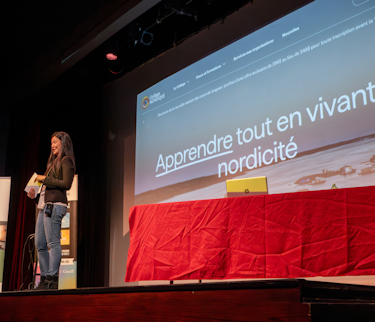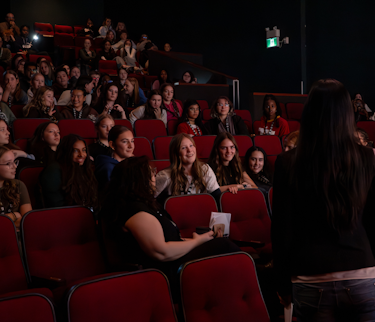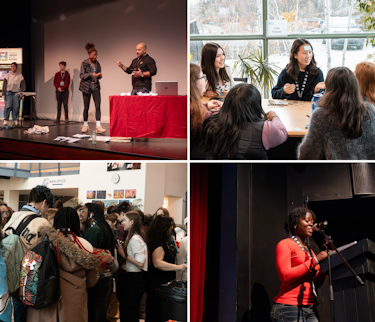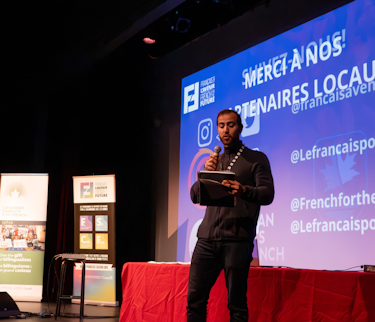Upcoming events
Stay informed about our upcoming activities at the College and in the community.
Free
Our cookies and those of our partners help improve your experience and analyze your use of the website. To learn all about cookies, check our privacy policy

« Tôi tên Hồng; Xozı sìyeh; my name is Rosie; je m’appelle Rosie. »
These were the words with which Rosie Benning, Director of Teaching and Training at Collège Nordique, opened her presentation at the French for the Future event on October 7. In four languages — Vietnamese, the tongue of her ancestors; Tłı̨chǫ and Wıı̀lıı̀deh, in homage to the peoples of the land where she lives; English, the language of her childhood; and French, the language of her career — she captured a plural identity shaped by cultural and linguistic diversity.
“I was fortunate to grow up between several cultures, several languages, several worlds, and I am grateful for everything each of them has given me,” she explained.
Her testimony, delivered to students from three Yellowknife schools, was an invitation to see French not merely as a school subject, but as a key to dreams and opportunities.

Rosie was born in Ontario to Vietnamese parents who fled their country by boat. “Until the age of four, I spoke only Vietnamese,” she recalls. English then came with school, and soon after, French entered her life as a new passion. Her learning, however, was not through immersion programs, but through basic French courses.
“Often, people think that I am a native French speaker. For me, that’s a huge compliment. It shows that with passion and energy, no matter where you start, you can go very far.”
Her first experiences with French were marked by fun and cultural discovery. She remembers a school trip to Quebec in grade 10, with skiing, snowshoeing and discovering a sugar shack: “I think I never ate so much maple syrup in my life! It was amazing. We laughed, we discovered the culture, and French was there, all around us.”
A few years later, Rosie took part in the Explore program, a summer immersion that allowed her to live in French daily.
“In Ontario, my friends often said they never used French. But once you laugh, sing or travel in French, it becomes unforgettable.”
For her, the message is clear: learning a language also means knowing how to enjoy it, and living it through authentic experiences.
At 19, a friend suggested she continue her studies in France. “It was crazy! I had no registration, no housing, and I wasn’t bilingual. But I decided to go for it.”
That bold choice took her to Paris, where she earned a degree in teaching French as a foreign language. Despite mistakes along the way — “I remember confusing faits divers (news items) with fées d’hiver (winter fairies)” — she learned that the key to language learning is courage.
“You don’t need to be perfect to start. Learning is a journey, not an exam.”
Back in Canada, Rosie applied for a teaching certificate and was accepted at the University of Toronto, then considered the best in the country in this field.
“I doubted myself, but the university saw something else: my origins, my background, my values. It taught me that grades do not define us, that our story and passions matter just as much.”
A few years later, another challenge awaited: moving to Hay River and later Yellowknife. “I came from Toronto and Paris, and here I was pregnant, in a northern winter at -30 degrees. But little by little, I discovered the richness of life in the North.” Today, she directs teaching at Collège Nordique, the only accredited French-language postsecondary institution north of the 60th parallel.
Her journey illustrates how French can become both a professional and personal springboard.
“French is a key. It opens doors to your dreams, your careers, and your communities.”
This advantage is also reflected in concrete data. In the Northwest Territories, a bilingual bonus of $1,200 per year is offered to employees who provide services in more than one language, whether in French or one of the Indigenous languages of the NWT. Positions such as bilingual services coordinator or emergency medical dispatcher can exceed $95,000 annually, with additional northern allowances. At the national level, according to Statistics Canada, bilingual Canadians earn on average nearly 10% more than unilingual Canadians.
“In short, bilingualism is good for your wallet, for your career, and for your heart,” Rosie sums up.
Rosie reminds students that there are many resources available to strengthen their French. The Explore and Odyssey programs offer immersive experiences across the country. Organizations such as AFCY and Canadian Parents for French organize social and cultural activities in Yellowknife and beyond. And for postsecondary studies, institutions such as the Université de l’Ontario français, Université de Hearst, McGill, and Collège Nordique welcome those who wish to pursue their studies in French.
Finally, Rosie emphasizes the strength of one’s origins. She is deeply grateful to her parents, Vietnamese refugees who braved the sea to give their children a better future. She also recalls her uncle Quân, whose knowledge of French and English saved his life during the Vietnam War.
“Languages are not just words. They are bridges. They connect us to one another.”
Her message to youth is simple and powerful:
“Courage is not the absence of fear. It is moving forward despite fear. And your roots will always give you the strength to go further.”
The testimony of Rosie Benning reminds us that French, beyond being an academic skill, is a gateway to dreams, careers, and communities. For those still hesitating, perhaps it is time to see French not as a constraint, but as a key to the future.
This speech took place as part of the French for the Future event, organized in collaboration with the AFCY, Canadian Parents for French, and the Explore program. Collège Nordique warmly thanks Lucas Beaudre, Project Manager and Master of Ceremonies for the day, as well as everyone who led workshops and activities. A special thank you goes to the students, whose enthusiasm and active participation gave true meaning to this forum. Together, partners, educators, and students demonstrate that by investing in French, we build strong bridges toward a future that is richer, more open, and more inclusive.


Published on October 8th 2025
Loading
Thank you for subscribing